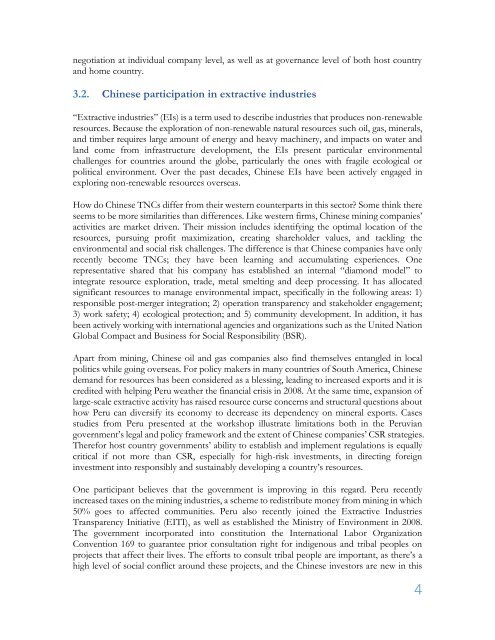Yale-WWF_final
Yale-WWF_final
Yale-WWF_final
You also want an ePaper? Increase the reach of your titles
YUMPU automatically turns print PDFs into web optimized ePapers that Google loves.
negotiation at individual company level, as well as at governance level of both host countryand home country.3.2. Chinese participation in extractive industries“Extractive industries” (EIs) is a term used to describe industries that produces non-renewableresources. Because the exploration of non-renewable natural resources such oil, gas, minerals,and timber requires large amount of energy and heavy machinery, and impacts on water andland come from infrastructure development, the EIs present particular environmentalchallenges for countries around the globe, particularly the ones with fragile ecological orpolitical environment. Over the past decades, Chinese EIs have been actively engaged inexploring non-renewable resources overseas.How do Chinese TNCs differ from their western counterparts in this sector? Some think thereseems to be more similarities than differences. Like western firms, Chinese mining companies’activities are market driven. Their mission includes identifying the optimal location of theresources, pursuing profit maximization, creating shareholder values, and tackling theenvironmental and social risk challenges. The difference is that Chinese companies have onlyrecently become TNCs; they have been learning and accumulating experiences. Onerepresentative shared that his company has established an internal “diamond model” tointegrate resource exploration, trade, metal smelting and deep processing. It has allocatedsignificant resources to manage environmental impact, specifically in the following areas: 1)responsible post-merger integration; 2) operation transparency and stakeholder engagement;3) work safety; 4) ecological protection; and 5) community development. In addition, it hasbeen actively working with international agencies and organizations such as the United NationGlobal Compact and Business for Social Responsibility (BSR).Apart from mining, Chinese oil and gas companies also find themselves entangled in localpolitics while going overseas. For policy makers in many countries of South America, Chinesedemand for resources has been considered as a blessing, leading to increased exports and it iscredited with helping Peru weather the financial crisis in 2008. At the same time, expansion oflarge-scale extractive activity has raised resource curse concerns and structural questions abouthow Peru can diversify its economy to decrease its dependency on mineral exports. Casesstudies from Peru presented at the workshop illustrate limitations both in the Peruviangovernment’s legal and policy framework and the extent of Chinese companies’ CSR strategies.Therefor host country governments’ ability to establish and implement regulations is equallycritical if not more than CSR, especially for high-risk investments, in directing foreigninvestment into responsibly and sustainably developing a country’s resources.One participant believes that the government is improving in this regard. Peru recentlyincreased taxes on the mining industries, a scheme to redistribute money from mining in which50% goes to affected communities. Peru also recently joined the Extractive IndustriesTransparency Initiative (EITI), as well as established the Ministry of Environment in 2008.The government incorporated into constitution the International Labor OrganizationConvention 169 to guarantee prior consultation right for indigenous and tribal peoples onprojects that affect their lives. The efforts to consult tribal people are important, as there’s ahigh level of social conflict around these projects, and the Chinese investors are new in this4


